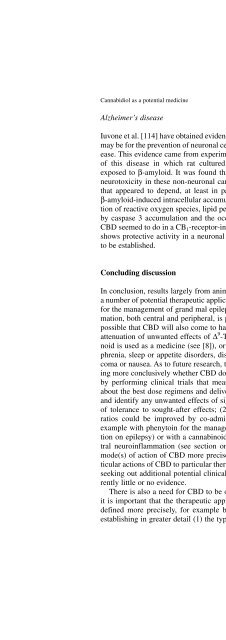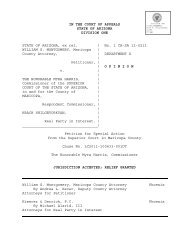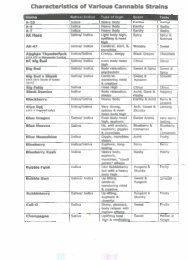3. Umbruch 4.4..2005 - Online Pot
3. Umbruch 4.4..2005 - Online Pot
3. Umbruch 4.4..2005 - Online Pot
Create successful ePaper yourself
Turn your PDF publications into a flip-book with our unique Google optimized e-Paper software.
Cannabidiol as a potential medicine 59<br />
Alzheimer’s disease<br />
Iuvone et al. [114] have obtained evidence that one clinical application of CBD<br />
may be for the prevention of neuronal cell death that occurs in Alzheimer’s disease.<br />
This evidence came from experiments performed with an in vitro model<br />
of this disease in which rat cultured pheocromocytoma PC12 cells were<br />
exposed to β-amyloid. It was found that CBD decreased β-amyloid-induced<br />
neurotoxicity in these non-neuronal cancer cells at 0.1–100 µM in a manner<br />
that appeared to depend, at least in part, on the ability of CBD to oppose<br />
β-amyloid-induced intracellular accumulation of Ca 2+ , intracellular accumulation<br />
of reactive oxygen species, lipid peroxidation and apoptosis, as measured<br />
by caspase 3 accumulation and the occurrence of DNA fragmentation. This<br />
CBD seemed to do in a CB 1-receptor-independent manner. Whether CBD also<br />
shows protective activity in a neuronal model of Alzheimer’s disease has yet<br />
to be established.<br />
Concluding discussion<br />
In conclusion, results largely from animal experiments indicate that CBD has<br />
a number of potential therapeutic applications. The evidence supporting its use<br />
for the management of grand mal epilepsy, anxiety, neurotoxicity and inflammation,<br />
both central and peripheral, is particularly convincing. However, it is<br />
possible that CBD will also come to have other clinical uses, for example the<br />
attenuation of unwanted effects of ∆ 9 -THC, when this psychoactive cannabinoid<br />
is used as a medicine (see [8]), or the treatment of cancer, acute schizophrenia,<br />
sleep or appetite disorders, disease- or drug-induced dystonia, glaucoma<br />
or nausea. As to future research, this should be directed at (1) establishing<br />
more conclusively whether CBD does indeed have therapeutic importance<br />
by performing clinical trials that measure its efficacy, provide information<br />
about the best dose regimens and delivery systems for particular applications<br />
and identify any unwanted effects of significance, including the development<br />
of tolerance to sought-after effects; (2) determining whether benefit-to-risk<br />
ratios could be improved by co-administering CBD with other drugs, for<br />
example with phenytoin for the management of grand mal epilepsy (see section<br />
on epilepsy) or with a cannabinoid CB 2 receptor antagonist to treat central<br />
neuroinflammation (see section on inflammation); (3) investigating the<br />
mode(s) of action of CBD more precisely and completely; (4) matching particular<br />
actions of CBD to particular therapeutic applications or side effects; (5)<br />
seeking out additional potential clinical uses for CBD for which there is currently<br />
little or no evidence.<br />
There is also a need for CBD to be optimized as a medicine. In particular,<br />
it is important that the therapeutic applications of this phytocannabinoid are<br />
defined more precisely, for example by mounting clinical trials directed at<br />
establishing in greater detail (1) the types of epilepsy, neurotoxicity, dystonia







